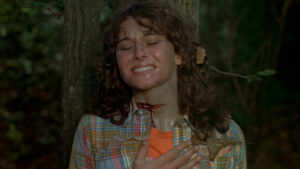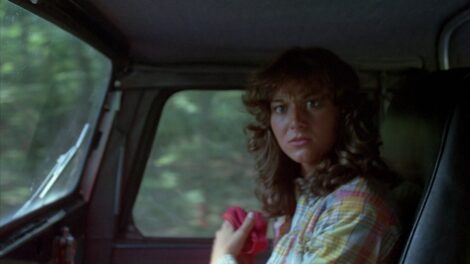Most characters don’t make it out alive in horror movies. Some survive until the final reel if they’re lucky, while others become bodies on the slab before the titles have even run! They are sacrifices for us bloodthirsty fans, but there’s more to them than that. They have wants never met. Stories never properly finished. In Always the Final Kill, Never the Final Girl, writer Matt Konopka digs up these poor souls lost under the shadow of heroes to give them the proper attention they deserve.
At this point, there’s been a good hundred-plus people that have met their demise in the FRIDAY THE 13TH franchise. And while critics of the series like to say that the characters are just bodies lined up for the slaughter—usually without having ever actually seen a FRIDAY movie—fans would argue the films have delivered plenty of souls who may not have survived, but resonate in the murky waters of our minds anyway. Perhaps the most revered of them is the girl we didn’t really get to know at all. The one who never made it to camp. The sweetest victim of this blood-soaked series. Annie (Robbi Morgan) from the very first FRIDAY THE 13TH (1980).
Following the deaths of two counselors at the hands of whom we later learn is Pamela Voorhees (Betsy Palmer), we meet Annie, making her way to the same camp where those murders were committed years ago. Dressed in flannel, heavy backpack hanging from her shoulders as she hitchhikes her way to her new job, she is, as she later refers to a truck driver who gives her a ride, “an American original”. Carefree. Ready to take on the world. Believing she’s safe in an area like Crystal Lake. But there’s another way you could consider her an “American original”. A darker way. The knowledge that she is yet another young woman in a long line of them who learns that a world that should be safe for her, isn’t.
When we first meet Annie, all smiles and showing kindness to a dog, she’s a beaming light. Her world view seems to be that of someone who finds good in everything and everyone. That all comes crashing down once Pamela picks her up and attacks her on the side of the road. Annie runs into the woods, possibly for the first time in her life off the beaten path of what she thought she knew about the world and the people in it. For her, it leads to death. For Pamela, the shattering of those beliefs led to madness. Hence the title credits smashing through glass, signaling the destruction of the protective wall between naivety and reality.
In a sense, Annie’s story isn’t all that different from Pamela’s.

Go all the way back to the drowning of Jason while camp counselors were off exploring the forest of carnal desire and you’ll find a woman in Mrs. Voorhees who had her trust betrayed by a system she believed in. As she says, they were supposed to be watching her son. We can assume she intends on slaying all of the counselors long before she picks Annie up off the street as some sort of misguided justice. But is it not reasonable to think that Pamela’s intent only turns to murder once Annie mentions that she’s working at the camp—doing the same job of cook that Pamela held during her time there—triggering her trauma and sending her on a murder spree? Sure, Mrs. Voorhees is no saint, but that doesn’t make her any less of a victim of Camp Crystal Lake.
In Cunningham’s film, women are denied a safe space at every turn, their trust turned against them. All throughout FRIDAY THE 13TH, they encounter lecherous men, whether it’s the truck driver commenting on how pretty Annie is or camp owner, Steve (Peter Brouwer), running his fingers through Final Girl Alice’s (Adrienne King) hair like the creep he is. If horror has taught us anything, it’s that men are not to be trusted. No surprise we as the audience believe a man must be committing the killings (Tom Savini’s hairy hand in Annie’s death scene doesn’t help). The reveal of Pamela as the killer is as much a betrayal to the characters as it is to the perception of the audience. Even the protective motherly presence of Betsy Palmer is an illusion.
What makes Annie’s death more tragic is how well telegraphed it is. Miller’s script puts a heavy emphasis on the idea of fate, such as Marcie’s childhood blood-storm dream. From Annie’s first moment to her last, the color red follows wherever she goes. She enters frame with a red gas pump. Steps into a gas station with a red phone booth outside. Hitches a ride with a truck driver in his red truck. All omens of the impending bloodshed. Through naivety or courage or both, Annie ignores the signs (not to mention the ramblings of curses). Perhaps Cunningham is aware in what he’s doing when Pamela approaches in her very blue, not-red truck. Subconsciously, Annie and the audience view this vehicle as “safe”, a relief from the bad omens on her tail. Too bad for her, looks are always deceiving in horror.
As Pamela’s knife slices across Annie’s throat, the scene fades to white. Traditionally in film, a fade to white is meant to imply a dream. We know—or have no reason to think—that FRIDAY THE 13TH is merely that. But the use of the technique seems apt here because it implies a fading of Annie’s dream of the world. It was never as kind, or as just, or as trustworthy as she hoped it was. In just a few minutes on screen, she encounters the judgement of a town that sees her as an outsider, the leering of older men, and the viciousness of a woman seeking vengeance for something she had nothing to do with. No explanation. No reason. The white light of her existence turned to red to screams to silence.

Unlike her peers, Annie doesn’t get the chance to engage in the drugs and sex that would become deadly tropes for teens in slasher movies. Instead, she serves as a reminder for young women to be careful who they trust. As a symbol for the way innocence is drowned in this society. And, just maybe, as the catalytic spark that sets Pamela’s angry flame ablaze. In the end, every counselor finds themselves on the same path of realization that it isn’t just Camp Crystal Lake that’s cursed, but the whole damn world. Annie’s just the first one unlucky enough to get there.
Tags: Adrienne King, Betsy Palmer, Friday the 13th, Peter Brouwer, Robbi Morgan, tom savini



No Comments